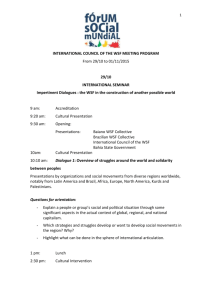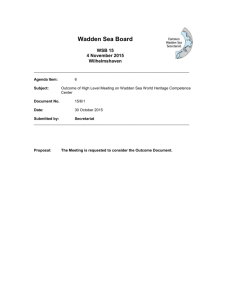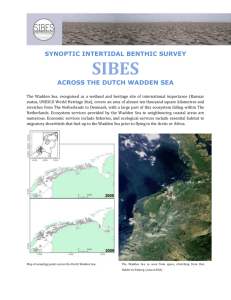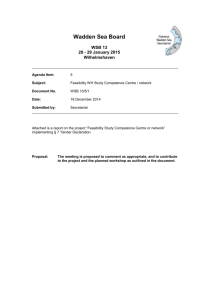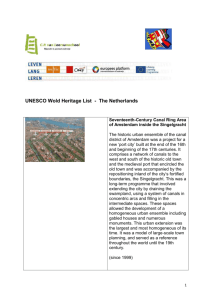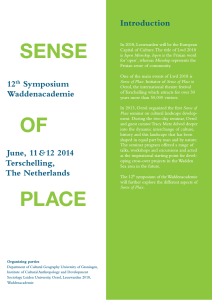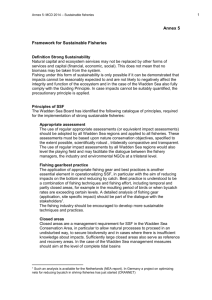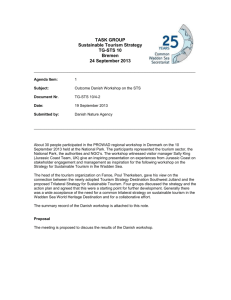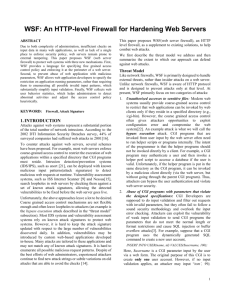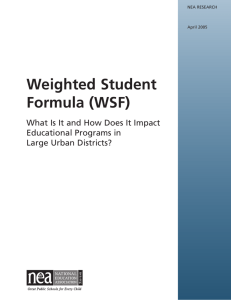Wadden Sea Board - Trilateral Wadden Sea Cooperation
advertisement
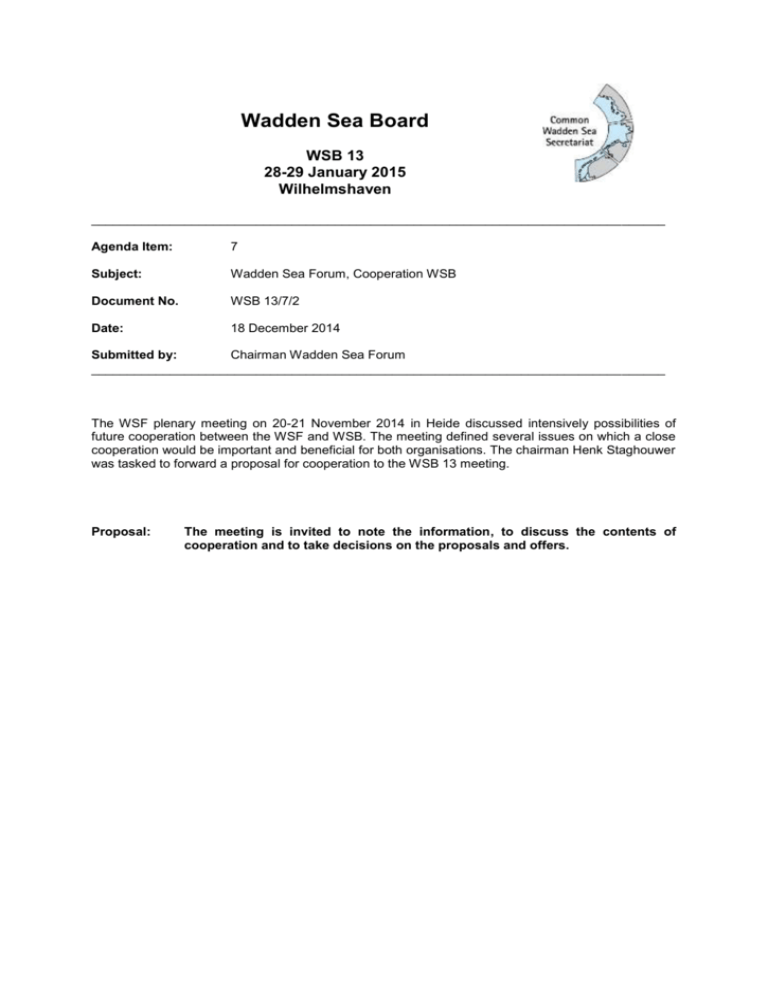
Wadden Sea Board WSB 13 28-29 January 2015 Wilhelmshaven ________________________________________________________________________________ Agenda Item: 7 Subject: Wadden Sea Forum, Cooperation WSB Document No. WSB 13/7/2 Date: 18 December 2014 Submitted by: Chairman Wadden Sea Forum ________________________________________________________________________________ The WSF plenary meeting on 20-21 November 2014 in Heide discussed intensively possibilities of future cooperation between the WSF and WSB. The meeting defined several issues on which a close cooperation would be important and beneficial for both organisations. The chairman Henk Staghouwer was tasked to forward a proposal for cooperation to the WSB 13 meeting. Proposal: The meeting is invited to note the information, to discuss the contents of cooperation and to take decisions on the proposals and offers. WSB 13/7/2 Cooperation WSF-WSB page 2 Cooperation WSF - WSB Introduction In the beginning of 2014 the WSF has finalized the ICZM strategy for the Wadden Sea Region. The strategy aims to work towards a sustainable society in 2030 and encompasses specific objectives, which are relevant for the implementation of the strategy. Generally speaking, the strategy builds the framework of the stakeholder cooperation for the coming years. The WSF has formulated three key objectives A sustainable social environment is of great importance for society and will strengthen the communal life and the interest for the Region. A healthy social dimension will also build a sound basis for cooperation and collaboration across various fields and will keep rural areas vibrant. A healthy economy should not only be beneficial for the welfare of society but should also generate surpluses for environmental protection measures. Balanced economic development keeps the region vibrant and provides future prospects for people living and working in the WSR. In a sustainable Wadden Sea Region, a healthy environment is a precondition and the basis for the socio-economic development. Background cooperation with the Trilateral Wadden Sea Cooperation To achieve the WSF vision of a sustainable society, a close cooperation with the political level and decision makers is necessary. The basis for this cooperation was laid at the 9th Trilateral Governmental Conference 2001 in Esbjerg, when the WSF was founded (§ 99 Esbjerg Declaration). The Schiermonnikoog Declaration 2005 highlighted the work of and the cooperation with the Forum: "We (the ministers) highly appreciate and accept the WSF as a valuable partner in achieving sustainable development in the Wadden Sea Region…." "We support and look forward to a close cooperation with the communities, stakeholders and NGOs to work in support of the sustainable development…" Also the Sylt Declaration 2010 acknowledged the work and recommendations of the WSF and agreed to support the cooperation with the WSF as an independent stakeholder organization. Tønder Declaration In February 2014, the WSF has forwarded the ICZM Strategy with a broad set of recommendations to the Trilateral Wadden Sea Governmental Council. Following, the Tønder Declaration welcomed the work of the WSF and the cooperation on topical issues. In § 66 it explicitly says "We (the ministers) continue to support the cooperation with WSF as an independent stakeholder organization in working towards a sustainable, environmental friendly Wadden Sea Region." The Declaration addresses many topics for further elaboration, in which the society and stakeholders have to be involved, e.g. the protection of the Wadden Sea World Heritage Site, implementation of the Sustainable Tourism Strategy, dealing with alien species, sustainable fisheries, energy transition and climate change mitigation and adaptation measures, shipping safety and goose management. WSB 13/7/2 Cooperation WSF-WSB page 3 Cooperation WSF - WSB Considering the Tønder Declaration, the Wadden Sea Forum as existing stakeholder forum with more than 12 years of experience is in a good position to cooperate with the WSB to support the implementation of the Declaration objectives. With two advisory seats of the WSF in the WSB, the cooperation can be continued and strengthened. This cooperation was welcomed as best practice example on European level when introducing the ICZM strategy at DG Environment of the EU Commission in Brussels and at the EU Commission's ICZM expert meeting this summer in Athens. In the following, the WSF points at the work fields, in which a close cooperation will be most valuable to proceed, in developing the Wadden Sea Region more sustainable. Several instruments of the WSF, particularly the sustainability indicator tool, the Planning Portal with information of all uses and protections schemes in the trilateral WSR and the climate atlas with scenarios for the entire Region are available and should be used in future collaboration. 1. Wadden Sea World Heritage Stakeholder involvement in the preservation and promotion of the Heritage Site is a precondition for the societal recognition of the outstanding natural values and beauties of the Region. Sustainable development behind the dikes as well as further off-shore will contribute to the protection of the Wadden Sea area. Therefore, a close cooperation of the state parties and the stakeholders in the Wadden Sea Region is of importance. As part of sustainable development, also an active support of the stakeholders to protect and to promote the World Heritage Site is necessary. The WSF offers to jointly develop a set of actions, e.g. foundation to be implemented by the WSB and WSF. 2. Sustainable Tourism Strategy To implement the strategic objectives of the sustainable tourism strategy, all stakeholders and sectors have to be made aware of the assets but also about the challenges enhancing the commitment and involvement of stakeholders in protecting the Wadden Sea World Heritage property. The WSF with its members of all relevant sectors, municipalities, counties and provinces could be a strong partner to support the work towards the objectives. Furthermore, the agricultural sector could play a substantial role in marketing local products, nature conservation and agri-tourism. The WSF can support the implementation of the sustainable tourism strategy according to specific objectives. It is proposed that responsible Task Group of the WSB define concrete measures, which can actively be supported respectively be carried out by the different sectors and stakeholders. The WSF partnership will support the implementation with its network and capacities. 3. Energy transition and Climate friendly Wadden Sea Region Energy transition from fossil and nuclear energy sources to renewables is a main political goal. This concept should contribute to reach a more climate friendly energy production. It would be necessary to elaborate first on an inventory of ongoing developments and concepts with regard to emission reduction, energy transitions and partnerships. This would point out gaps in information and knowledge and highlight the real needs and open questions regarding the implementation of energy transition and a climate friendly Wadden Sea Region. In this respect, also the energy grid should be addressed as a North Sea grid, which connects all off-shore installations. This would minimize the impacts on the coastal region, as the number of cable connections to the mainland would be reduced. In a second step, concrete actions and measures have to be elaborated and implemented to developing the WSR into a climate friendly region and to support sustainable energy production and distribution. It is proposed that WSB and WSF cooperate to firstly define the aim of a CO2 neutral WSR and secondly to carry out an inventory with regard to energy transition and best examples of CO 2 reduction. Stakeholders and governments should compile existing/ongoing measures and development plans. Following, an action plan including responsibilities can be jointly developed and finally implemented to reach the envisaged aim of a CO2 neutral Wadden Sea Region. Where possible, the regional and local networks in the WSB can deliver support to commit the responsible people on the political level. In order to reach the goal of a CO2 neutral Wadden Sea Region (Sylt and Tønder Declaration), the political level and the stakeholders have to cooperate very closely. The usage of more renewable energy, emission reduction in all traffic systems, energy saving as well as the notion of trilateral WSB 13/7/2 Cooperation WSF-WSB page 4 emission certificate trading needs both, political decision making and implementations by the sectors and the public. Besides emission mitigation measures, climate change adaptation measures have to be developed and implemented. This concerns coastal protection, water management in the hinterland, social health care as well as a risk management due to climate change. Regional and local governments together with the society and stakeholders should develop sound strategies and concepts to cope with climate change adaptation. It is proposed to involve the WSF in the implementation of the climate change adaptation strategy as it spatially covers a wider off-shore area as well as parts of the coastal mainland. Adaptation strategies need the involvement of the sectors and society, represented by the WSF. Furthermore, the WSF is working on risk management inter alia with regard to climate change. The perceptions, experience and knowledge of the stakeholders have to be considered. Therefore, it is proposed that a representative of the WSF participates in the TG Climate. 4. Shipping In the past, two working groups worked on shipping issues in the Wadden Sea and coastal waters – the TG Shipping of the TWSC and the WG Shipping & Harbor of the WSF. The WSF is of the opinion that it would be very valuable to establish a joint shipping group, encompassing representatives of administration, nature protection, ship owners, harbor business and of the regions/municipalities. The group could work on shipping safety in the southern North Sea, the implementation of vessel traffic management, LNG in shipping, green ports, etc. This would contribute to safeguard the Wadden Sea World Heritage Site, to make shipping cleaner and to develop small Wadden Sea harbors in a sustainable way. A joint working group with an independent chair would pool work forces, foster a dialogue among authorities and stakeholders and contribute to solve conflicts and finally, to implement joint measures. The WSF proposes to establish a joint shipping group. In order to proceed it is further proposed that a small group with representatives from both former shipping groups should elaborate Terms of References including the definition of objectives to be achieved until 2018 and in the long run as well as the responsibilities within the joint group. 5. Trilateral Goose Management Scheme The WSF has elaborated a trilateral goose management scheme, which was forwarded to the WSB in December last year. The report was very much welcomed and seen as a step forward to minimize conflicts between nature protection and the agricultural sector. The next step would be to implement the recommendations with support of the Danish municipalities/regions, the Dutch provinces and the German states/regions. A project group under the responsibility of the regional governments and advice from the WSF goose management group should take the lead to implement the goose management scheme in a defined and agreed period. The WSB could contribute to installing the described project group and to help installing a monitoring program in line with TMAP and AEWA hunting bag statistics.
